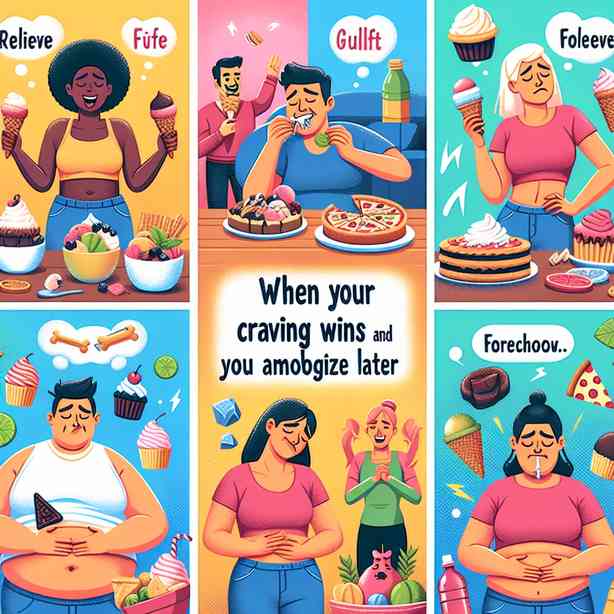
Life is full of temptations and cravings, and sometimes despite our best intentions, we find ourselves giving in to these urges. It is a common human experience to feel the pull of instant gratification, whether it’s indulging in a delicious treat, procrastinating on an important task, or succumbing to the lure of a shopping spree. While these moments can provide temporary satisfaction, they often lead to feelings of guilt and regret later on. In this exploration of cravings and their consequences, we will delve into the psychology behind our impulses, how to manage them more effectively, and the importance of self-forgiveness when we do slip up.
From a psychological perspective, cravings are complex reactions influenced by various factors, including biology, emotions, and environmental cues. When we experience a craving, our brain often prompts us to seek immediate pleasure, overriding our rational decision-making processes. This disconnect between our short-term desires and long-term goals is a common struggle. For instance, someone who is trying to maintain a healthy lifestyle may find themselves reaching for a piece of cake after a long and stressful day at work, simply because it offers a momentary escape and pleasure. Understanding this psychological mechanism is the first step in managing our cravings more effectively.
Moreover, societal and cultural contexts play a significant role in shaping our cravings. Advertising, social media, and even peer pressure can amplify our desires for certain foods, experiences, or material possessions. When we see others enjoying lavish meals or extravagant shopping sprees, we may feel compelled to partake as well, often justifying our decisions by saying we deserve a treat or that it’s just a one-time indulgence. This social influence can create a cycle of craving and indulgence, leading to moments of regret when we realize that our actions do not align with our values or goals. Acknowledging these influences can help us build a more mindful approach to handling our cravings.
So, how can we better manage our cravings and avoid the cycle of indulgence followed by regret? One effective strategy is to practice mindfulness. By cultivating an awareness of our thoughts and feelings in the moment, we can create space between the craving and our response to it. Mindfulness allows us to observe our cravings without judgment, providing us with the opportunity to make conscious choices rather than acting out of impulse. Techniques such as deep breathing, meditation, or simply pausing to reflect can be powerful tools in resisting the urge to give in.
Another valuable approach is to explore the underlying emotions that trigger our cravings. Often, we turn to food, shopping, or other distractions not just for pleasure, but to cope with stress, boredom, or anxiety. By identifying and addressing these emotional triggers, we can find healthier alternatives to fulfill our needs. For instance, if stress is a common trigger, incorporating regular exercise, engaging in hobbies, or talking to a friend can provide positive outlets that satisfy our emotional needs without leading to regretful choices.
Despite our best efforts, there will inevitably be times when we give in to our cravings, leading us to apologize or feel remorseful for our actions. It is essential to approach these moments with compassion towards ourselves. Self-forgiveness is a crucial aspect of maintaining our mental and emotional well-being. When we allow ourselves to acknowledge that everyone succumbs to cravings at times, we can recover from our setbacks more swiftly and with greater ease.
Furthermore, reflecting on these experiences can offer valuable insights for the future. Instead of fixating on guilt, consider what led to the indulgence. Was it a particular situation, emotion, or external pressure? This reflection can help us develop strategies to navigate similar situations in the future, enabling us to respond in ways that align more closely with our values and goals.
Additionally, it could be beneficial to set realistic expectations for ourselves. Perfection is unattainable, and the journey toward self-improvement is often filled with ups and downs. Rather than striving for an all-or-nothing mentality, embracing a more balanced approach can lead to a healthier relationship with cravings. Allowing ourselves the occasional treat or indulgence, framed within a context of moderation, can actually prevent the buildup of guilt and frustration that often accompanies deprivation.
Building a support network is another significant factor in managing cravings. Surrounding ourselves with friends or family members who share our goals and values can provide encouragement and accountability. When we have others to lean on, we are more likely to make choices that align with our desires for healthier lifestyles or fulfilling financial goals. Engaging in group activities, whether they involve exercise or shared interests, can foster positive environments that naturally discourage excessive indulgence.
In conclusion, the interplay between cravings and our actions is a nuanced aspect of the human experience. Understanding the psychological and social influences driving our desires is key to developing effective strategies for managing them. Practicing mindfulness, addressing emotional triggers, and fostering self-forgiveness can empower us to navigate our cravings more successfully. Additionally, setting realistic expectations and building a supportive community can enhance our journey toward balance and well-being. Remember, it’s not about being perfect; it’s about making progress and treating ourselves with kindness, even when our cravings win and we find ourselves apologizing for our choices. Ultimately, every setback can be an opportunity for growth, leading us closer to understanding ourselves and our relationship with desire.


